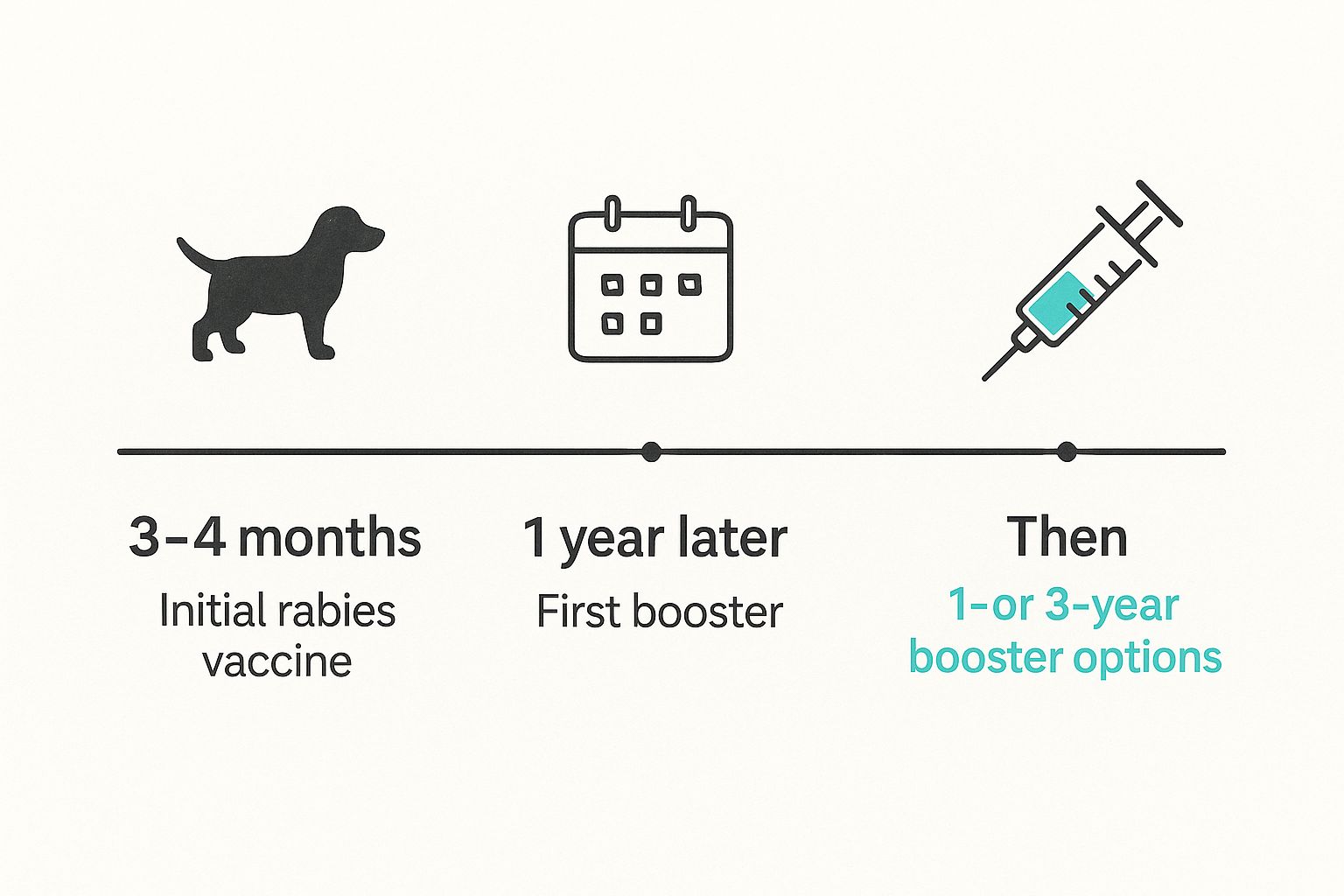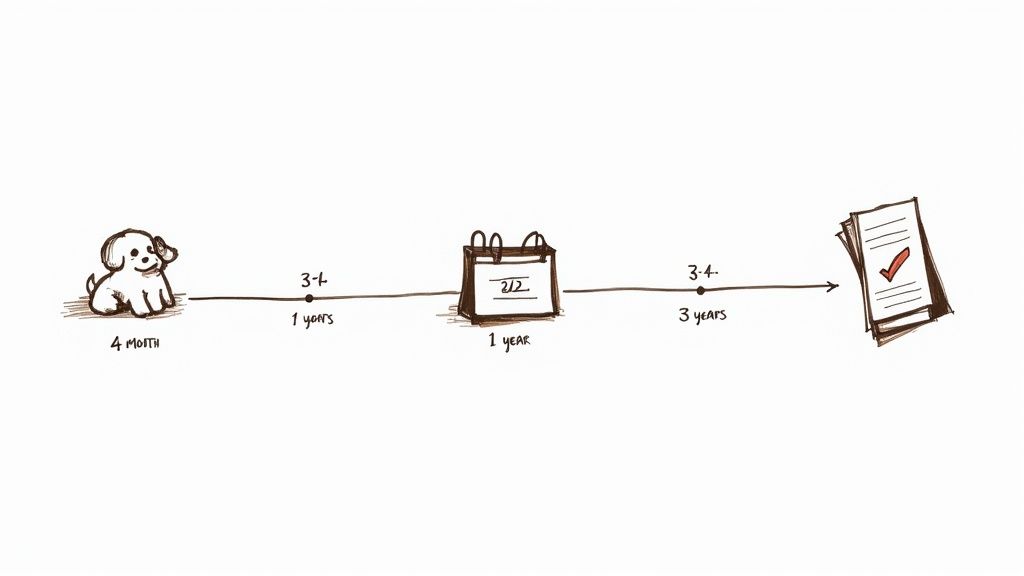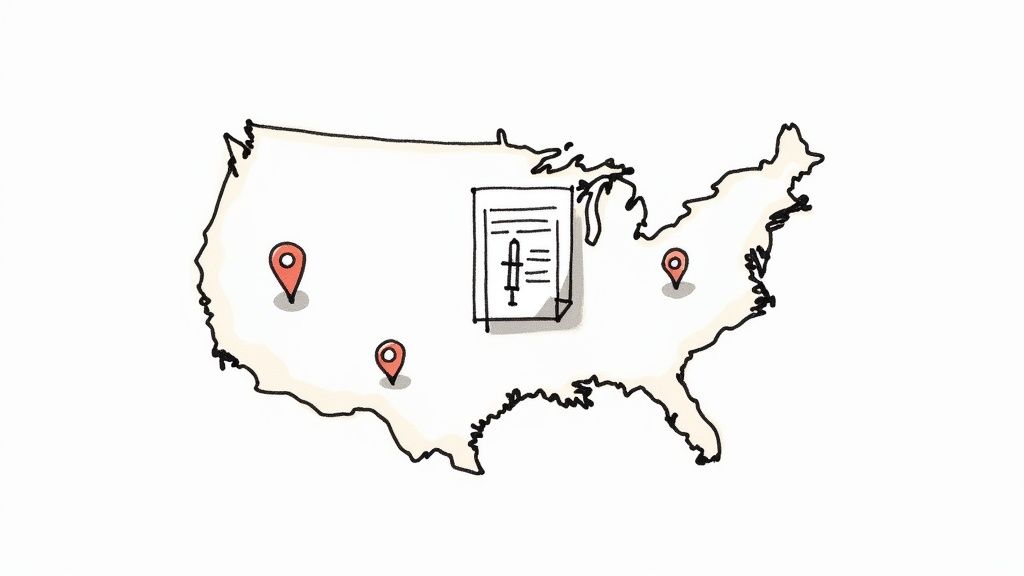Are you a team member in a veterinary practice?
Are you a pet parent planning a trip with your furry pal?
Oct 12, 2025
How Often Does Your Dog Need a Rabies Vaccine? An Expert Guide
So, how often does your dog actually need a rabies vaccine? The short answer is, after the initial puppy shot and a one-year booster, most dogs are on a one-to-three-year booster schedule. The exact timing really boils down to the type of vaccine your vet uses and, just as importantly, your local guidelines.
Your Quick Guide to Rabies Vaccine Frequency
Keeping up with your dog's shots can feel like one more thing on a never-ending to-do list. But the rabies vaccine? That's one you absolutely can't skip. It’s a key part of responsible pet ownership, protecting not only your best friend but everyone in your community, too. Think of it as a non-negotiable safety measure, like a seatbelt for their health.
While the exact schedule can have some slight variations, most vets follow a standard, proven protocol. It all starts with that first puppy vaccine, which is followed up with a booster shot a year later. From there, your vet will help you choose between a one-year or three-year vaccine to keep their immunity strong. It's a pretty straightforward process once you get the hang of it.
The Typical Rabies Vaccine Timeline
This handy visual lays out the key milestones in your dog's rabies vaccination schedule, making it easy to see the journey from puppyhood to adulthood.

As you can see, the schedule is predictable. It kicks off with the puppy shot, gets reinforced with that crucial one-year booster, and then settles into a regular booster routine. This consistency makes it much easier to plan ahead and stay on top of your dog's healthcare needs.
To make it even clearer, here is a simple table outlining the standard vaccination timeline for most dogs.
Typical Dog Rabies Vaccination Timeline
This table outlines the standard schedule for rabies vaccinations, from a puppy's first shot to ongoing adult boosters.
Vaccination Stage | Dog's Typical Age | Vaccine Frequency |
|---|---|---|
Initial Puppy Vaccine | 3-4 months old | First-time shot |
First Adult Booster | 1 year after initial shot | One-time booster |
Ongoing Adult Boosters | Every 1 or 3 years | Recurring, based on vaccine type and local rules |
Following this timeline is the best way to ensure your dog maintains continuous protection against rabies throughout its life. Your veterinarian will provide the exact dates and help you set reminders for each upcoming booster.
Why Rabies Vaccines Are a Must for Every Dog

It's easy to get focused on how often your dog needs a rabies shot, but let's take a step back and talk about why this vaccine is so incredibly important. Rabies is a viral disease that attacks the central nervous system of mammals—including our dogs and us.
Once symptoms appear, it is almost always fatal. That’s not a statistic to take lightly. Prevention is our only real defense.
This isn't an optional add-on; veterinarians consider the rabies vaccine a core vaccine. That means every single dog needs it. It doesn't matter if your pup is a city-dweller who sticks to the sidewalk or a country dog with acres to explore. This shot is vital for their safety.
The virus is most often spread through the saliva of an infected animal, usually from a bite. Vaccinating your dog creates a vital shield, protecting them from encounters with wildlife like raccoons, bats, and foxes that can carry the disease. It’s a simple injection with powerful, life-saving consequences.
More Than Just Your Dog's Health
Protecting your own pet is reason enough, but the rabies vaccine plays a much bigger role in public health. Because our dogs live so closely with us, keeping them vaccinated is one of the most effective strategies we have to stop the virus from ever reaching people.
This isn’t just about local safety; it's a global issue. Rabies is responsible for an estimated 59,000 human deaths every year worldwide, with the vast majority of cases stemming from dog bites. Widespread canine vaccination is the single most important tool for breaking that tragic cycle. If you're interested in the data, you can learn more about how crucial dog vaccination is for global health in recent studies.
By keeping your dog's rabies vaccine up to date, you're doing more than just following a schedule. You are actively participating in a global public health effort to eliminate one of the world's deadliest diseases.
When it comes down to it, this one simple shot is one of the most profound things you can do for your furry best friend and for everyone in your community. It’s not just a recommendation—it’s a fundamental part of preventing an awful and unnecessary tragedy.
Decoding the Standard Rabies Vaccine Schedule

Figuring out the timing for your dog's rabies vaccine doesn't have to feel like guesswork. The whole process kicks off with their very first puppy shot, which lays the groundwork for a lifetime of protection against this serious virus. It's a huge milestone in your pup's early days.
From that point on, the schedule is surprisingly straightforward. It follows a clear path designed to build up their immunity and keep it strong, ensuring your best friend stays safe.
The Puppy and First-Year Protocol
Your puppy's first rabies shot is usually given when they're between 12 and 16 weeks old (that's about 3-4 months). This window is chosen carefully, making sure their little immune system is developed enough to get the full benefit of the vaccine.
Exactly one year after that initial shot, your dog will need their first booster. This isn't just a suggestion—it's a critical step that really locks in their immunity for the long haul. Think of it like a software update for their immune system; the first shot installs the program, and the booster ensures it's running at full strength.
Understanding how this fits into the bigger picture of vaccinations is key. For a really detailed breakdown of what shots puppies need and when, this essential guide to puppy vaccination schedules is a fantastic resource, especially for navigating any regional differences.
Choosing Between 1-Year and 3-Year Boosters
After that one-year booster, you'll work with your vet to set up an ongoing schedule. This is where you’ll run into the choice between a 1-year and a 3-year vaccine. The decision isn’t just personal preference; it’s often determined by local rules and your vet’s professional advice.
A common myth is that a "3-year vaccine" is somehow stronger than a "1-year" one. The truth is, they're just formulated to last for different durations. The most important thing to remember is that the first booster, given one year after the puppy shot, is almost always a 1-year vaccine to establish rock-solid immunity.
Your vet is the best source for what's recommended in your city or county. Some areas might suggest annual rabies shots no matter what, while others are perfectly fine with the 3-year option after the initial sequence is complete.
Keeping this schedule current is also a must if you ever plan on traveling. An up-to-date rabies vaccine is a non-negotiable part of getting a pet health certificate for travel. Trust us, that's one detail you don't want to get wrong—it’s just not worth the bark-ache!
How Local Rules Shape Your Dog's Vaccine Needs

When it comes to your dog's rabies vaccine schedule, your veterinarian isn't the only one calling the shots—local rules play a huge role, too. It’s a common misconception that rabies vaccination is just a strong medical recommendation. In many places, it’s actually a local requirement.
These rules are anything but uniform. The answer to "how often does my dog need a rabies shot?" can change dramatically depending on your state, county, or even your city. This patchwork of regulations means there's no one-size-fits-all approach.
For instance, one town might suggest a rabies booster every single year, no exceptions. Drive ten minutes to the next town over, and they might fully accept a 3-year vaccine after the initial one-year booster. That’s why it’s so critical to check your specific local guidelines to stay on the right side of any rules.
Why Keeping Records Is So Important
Hanging onto your dog’s rabies vaccination certificate is more than just good organization—it’s a must-have. This single piece of paper is your official proof that your dog is up-to-date and protected, and you'll find yourself needing it more often than you think.
You'll almost certainly need to show proof of vaccination for a variety of everyday services:
Dog Licensing: Most municipalities won't issue a license without a current rabies vaccine certificate.
Boarding and Daycare: Kennels and doggy daycares require it to ensure the safety of all pets in their care.
Grooming Salons: Professional groomers need to maintain a safe environment for every pet and their staff.
Traveling: If you plan on taking a trip with your furry friend, this paperwork is essential. For more complex journeys, our guide on international pet travel requirements offers a deeper look into the documentation you'll need.
In the unfortunate event of a bite incident, having immediate proof of vaccination can de-escalate a stressful situation in a hurry. It's a cornerstone document for responsible pet ownership.
Staying current with vaccinations and keeping your records handy isn't just about following rules. It’s about being prepared and making sure your dog can safely participate in all aspects of life. It's one of the simplest ways to prove you’re a truly pawsome pet parent.
Special Factors That Can Alter the Vaccine Schedule
While standard timelines and local rules cover most situations, life sometimes throws a curveball that can shake up your dog's vaccine plan. These special circumstances often require a bit of extra planning to make sure your dog is both safe and compliant, wherever your adventures might take you.
One of the biggest game-changers is international travel. Many countries, especially those that are rabies-free, have incredibly strict rules. Prepping for a move or a long trip abroad isn't just about booking a flight; it often means following a precise vaccination schedule, getting blood tests (like a rabies titer test), and securing specific health certificates months in advance. To get a handle on the paperwork, you can learn more about how to get a USDA-endorsed pet health certificate to ensure a smooth process.
Your Vet's Role in Unique Cases
Your veterinarian is your most important partner when navigating these complexities. They're looking at more than just the calendar date. For instance, if you live in a rural area with a high population of wildlife like raccoons or bats, your vet might more strongly recommend sticking to a specific booster schedule.
As another example, if you are relocating your pet to Dubai, there are very specific veterinary requirements and schedules you'll need to follow.
While extremely rare for a critical vaccine like rabies, a dog's overall health history might be taken into account. Your vet will always weigh the individual risk versus the benefit to make the safest call for your canine companion.
Ultimately, these special situations show why a one-size-fits-all approach doesn't always work. It’s all about balancing public health goals with your dog's specific needs. The World Health Organization recommends at least 70% of dogs in an area be vaccinated to prevent outbreaks, a goal that individual pet owners like you help achieve every single day.
Common Questions About Dog Rabies Vaccines
Even with a clear schedule, it's totally normal to have a few more questions rattling around in your head. When you're dealing with something as serious as rabies, you want to be 100% certain you have all the facts straight. Let's clear up any final confusion.
We've pulled together the most common "what if" scenarios that pet parents ask about. Think of this as your go-to guide for those tricky situations.
What Happens If My Dog Is Late for a Rabies Booster?
Life gets hectic, and sometimes a vaccine due date sneaks past you. It happens. If you realize your dog is overdue for their rabies booster, the first thing to do is call your veterinarian. Don't panic, just get them on the phone.
Your vet knows the specific local rules inside and out. In many places, they can simply give the booster and get your dog's records updated. However, if a lot of time has passed, some jurisdictions might consider the vaccination "lapsed." This could mean your dog needs a 1-year vaccine to get back on schedule before they can return to the 3-year booster cycle. The key is to act fast to avoid any potential snags.
Are There Side Effects to the Rabies Vaccine?
The good news is that the rabies vaccine is very safe, and serious reactions are extremely rare. Most dogs don't even seem to notice they've had a shot and are back to their normal selves right away.
If your dog does have a response, it's usually very mild. You might see a little soreness at the injection site or notice they're a bit sluggish for a day or so. These things almost always clear up on their own. In very rare cases, an allergic reaction like facial swelling or hives can occur—if you see that, call your vet immediately. But the massive benefit of preventing a serious disease far outweighs the tiny risk of minor side effects.
The peace of mind that comes with vaccination is truly priceless. It's a simple shot that offers powerful protection against one of nature's most dangerous viruses.
Can a Titer Test Replace the Rabies Vaccine?
This is a big one. A rabies titer test is a blood test that measures the level of rabies antibodies in your dog’s system. It shows their immune system responded to a past vaccine, but in most areas, it is not accepted as a substitute for a current rabies vaccination for local compliance purposes.
The rules are often based on the vaccination date on the certificate, not the antibody levels in the blood. Titer tests are mainly used for things like international pet travel, where they prove a pet is protected before entering a rabies-free country. So while a high titer is fantastic, you still have to follow your local vaccine guidelines. It's important to keep your records straight, and you can learn more about what counts as valid proof of a rabies vaccine in our detailed guide.
Navigating pet travel can be complex, but Passpaw is here to help. Our platform simplifies the process of obtaining international pet health certificates, making compliance easier for both veterinarians and pet owners. Learn more about how Passpaw can ensure a smooth journey for your furry family member.

More articles
From regulatory changes to best practices for veterinarians and pet owners, our resources keep you ahead of the curve.



